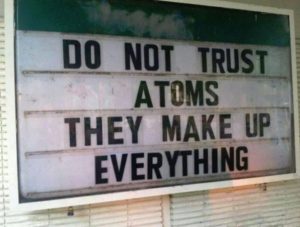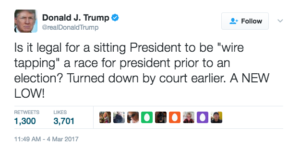 I’m pretty well convinced that knowledge is the norm of assertion — that one should not assert that p unless one knows that p. (Here is a Philosophy15 about it.) There are a few puzzle cases with the norm (blameless assertions like in cases of weird Gettier scenarios and so on) but it otherwise looks about right. So it seems right that if someone says something true, but without warranting evidence, though that person was correct, the assertion isn’t praiseworthy, and the person isn’t fully creditable for the assertion. In fact, asserting without warrant is blameworthy, even if what was said came out true.
I’m pretty well convinced that knowledge is the norm of assertion — that one should not assert that p unless one knows that p. (Here is a Philosophy15 about it.) There are a few puzzle cases with the norm (blameless assertions like in cases of weird Gettier scenarios and so on) but it otherwise looks about right. So it seems right that if someone says something true, but without warranting evidence, though that person was correct, the assertion isn’t praiseworthy, and the person isn’t fully creditable for the assertion. In fact, asserting without warrant is blameworthy, even if what was said came out true.
So, for example, had I said way back in 2000, without any reason favoring its truth, that Donald J. Trump would one day be President, I would have said something true, but still something unwarranted. And though it came to pass that DJT is President, it’s not like that statement is vindicated or I should get any more credit for it than your friend who hits the hole-in-one on the mini-golf hole when he’s taking a drink of his soda and looking elsewhere. And moreover, I’m inclined to say that would still be intellectually blameworthy for saying things without backing.
And so, now, over at The American Spectator, Daniel Flynn makes the case that DJT was right all along about the government spying on his campaign. And he analogizes the situation to that of Watergate – that the party in power spies on the opposition party in the midst of an election. Flynn opens with a pretty catchy line:
Vladimir Putin did not hack the election. Barack Obama did.
DJT, then a candidate, said that the Obama Administration had wiretapped the Trump Tower. He didn’t have evidence for this, beyond a radio show by Mark Levin’s claims. When asked about it, nothing.
How low has President Obama gone to tapp my phones during the very sacred election process. This is Nixon/Watergate. Bad (or sick) guy!
— Donald J. Trump (@realDonaldTrump) March 4, 2017
Now, it turns out that, as reported by CNN, the feds were listening in on Paul Manafort.  It’s important to note that, according to the report (again from CNN): “While Manafort has a residence in Trump Tower, it’s unclear whether FBI surveillance of him took place there.” So we don’t know if it was Trump Tower being tapped.
But does this stop Daniel Flynn from wagging his finger? Oh, no.
The media went all-in this spring on the notion that the loose-tongued Trump once again spoke without reference to the facts. Newsweek’s Nina Burleigh labeled his charge “incendiary.†The Los Angeles Times called it “a phony conspiracy theory.†PolitiFact bluntly judged his accusation “false.â€
Who will fact check the fact checkers?
Now, the issue is how to read all the vagaries of what it is to ‘tapp’ a phone or whether the issue is whether ‘my’ phones are really Paul Manafort’s phones. Regardless, the issue is whether we can give any credit to someone who makes a charge like this (even when true) with no evidence?

